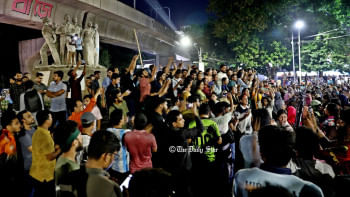Cops hunt for top militant who supplied grenades
Sohel Mahfuz, who has been a key leader of banned militant outfit Jama'atul Mujahideen Bangladesh (JMB) for over a decade, supplied grenades used in the Gulshan café attack.
“He supplied the fruits [militants call grenades fruits] which were used in the attack,” said Monirul Islam, chief of the Counter Terrorism and Transnational Crime unit of Dhaka Metropolitan Police.
Sohel played an important role in the Gulshan attack, he told journalists yesterday.
Monirul, also an additional commissioner of DMP, said many JMB leaders did not join “Neo JMB”, but Sohel did. Hailing from Kushtia, Sohel is believed to have badly injured his left hand while making bombs.
However, the DMP official did not elaborate on when Sohel joined the new militant outfit and whether he had supplied all the grenades used in the July 1 attack that killed 20 hostages, mostly foreigners.
Sohel is a close relative of Nurul Islam Marzan, a key leader of “Neo JMB”. Investigators said Marzan went on a recce to the Gulshan café area and after receiving information from him, “Neo JMB” coordinator Tamim Ahmed Chowdhury finalised the attack plan.
Seeking anonymity, a top investigator said Marzan from Pabna had a connection with Sohel, as one of his brothers married a maternal aunt of Marzan. The official said Marzan was under surveillance.
Also known as “Hathkata Mahfuz”, Sohel joined the banned organisation during its initial years under the command of first JMB chief Shaykh Abdur Rahman.
Rahman along with five others, including his deputy Siddiqul Islam alias Bangla Bhai and brother Ataur Rahman Sunny, was executed on March 29 in 2007.
After the executions of some top JMB leaders, Sohel became a member of the JMB's Majlis-e-Shura, the highest policy-making body of the outfit, with Maulana Saidur Rahman as its chief.
Law enforcers have been on the hunt for Sohel for many years. They on several occasions had claimed Sohel fled to India where he helped their Indian associates establish a militant network in West Bengal.
The name of Sohel, who used fake name Nasrullah, was common on the lists of militants and criminals exchanged between Dhaka and New Delhi in February last year. The names of three other top JMB men also appeared in both the lists, according to DMP sources.
These militants have been staying in West Bengal for the last few years. They came to Bangladesh whenever they thought it to be safe, the sources added.
IGP IN CHAPAINAWABGANJ
Inspector General of Police AKM Shahidul Hoque yesterday urged people to remain vigilant and inform law enforcers about those involved in militancy.
“Now militancy is our big challenge and we need to create social awareness to counter it,” the police chief told newsmen after attending a programme in Chapainawabganj, reports our correspondent.
The programme was organised to destroy narcotics seized in the district.
RAB ARRESTED 26 'MILITANTS'
The Rapid Action Battalion has so far arrested 26 suspected militants from across the country after the Gulshan attack, Rab Director General Benazir Ahmed said yesterday.
The arrestees include members of banned militant outfits JMB, Ansarullah Bangla Team, Hizb-ut Tahrir, and “Neo-JMB”, he told reporters during his visit to Kamalapur Railway Station in the city.
The Rab chief said law enforcers were working to ensure security in the country during Eid-ul-Azha keeping the Gulshan attack in mind.

 For all latest news, follow The Daily Star's Google News channel.
For all latest news, follow The Daily Star's Google News channel. 



Comments